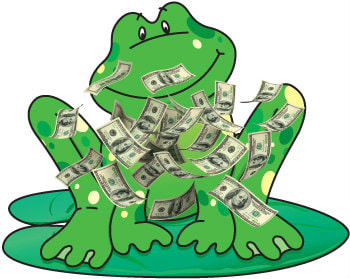But what happens when you can't agree to the terms of a barter. I still want your worms but you don't need another book. What then? That's where commodity money comes into play. A commodity is a basic item used by nearly everyone, salt, tea, tobacco, and seeds were some early commodities and were once used as money. Occasionally, though, someone would wind up with too much of one type of commodity. These items were bulky and difficult to store. Some were perishable and others were heavy and difficult to carry around. Commodity money had its own set of drawbacks. So now what?
Metal objects were introduced as money around 5000 B.C. The Lydians, around 700 B.C. became the first people in the western world to make coins. Countries soon began minting coins with specific values. Metal was used to make these coins because it was readily available, easy to work with, and could be recycled...melted down and used again. When coins had a specific value, it became easier to compare the cost of the items people wanted. Some of the earliest pieces of paper money can be traced back to China. From AD 960 forward, paper money became common. "With the introduction of paper currency and non-precious coinage, commodity money evolved into representative money. This meant that what money itself was made of no longer had to be very valuable. Representative money was backed by a government or bank's promise to exchange it for a certain amount of silver or gold." Representative money was common with most of the majority of currencies throughout the 19th and 20th centuries.
What about now, in the 21st century? Representative money has been replaced by "Fiat" currency. Fiat is the Latin word for "let it be done." Money is now given value by government decree, or fiat. What this means is that legal money was given enforceable legal tender laws. This means that refusal to accept the legal tender in favor of some other form of payment is now against the law.
No matter what you call it or how you spend it, money has become a necessity in all our lives. While we need it to live and pay our bills, it good to remember that money is just money. And even though it can buy creature comforts, it cannot buy happiness. That comes free of charge if we're just willing to spend a little time simply appreciating the world around us.
Until tomorrow, I wish you all
Peace.

 RSS Feed
RSS Feed